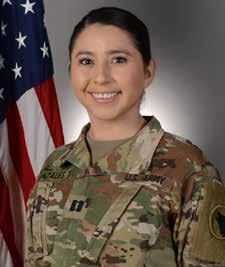
3 minute read
Suicide Prevention Course Offers Benefits to Soldiers and Beyond
By Capt. Alexis Gonzales Headquarters Company, 1st Brigade, 104th Training Division (Leader Training)
JOINT BASE LEWISMCCHORD, Wash. – I had the honor of attending the Suicide Prevention course at the 104th Training Division (Leader Training) headquarters at Joint Base LewisMcChord on June 21-22, 2022.
Advertisement
This was an invaluable course.
Equipping leaders and soldiers with the tools of suicide prevention not only helps the Soldiers that they interact with, but it also helps every other person in their lives. This includes their children, families, Civilian coworkers, and communities, which is why this topic has a place near and dear to my heart. If we empower the leaders of our Army with these skills, we can not only save lives, but we can improve the lives of everyone around us.
Throughout the course, I couldn’t help but make connections from this course to my Civilian career. I am a social emotional learning (SEL) specialist at an elementary school in Westminster, Colorado.
Taken from the Collaborative for Academic, Social, and Emotional Learning website, “SEL is the process through which all young people and adults acquire and apply the knowledge, skills, and attitudes to develop healthy identities, manage emotions and achieve personal and collective goals, feel and show empathy for others, establish and maintain supportive
Capt. Alexis Gonzales Headquarters Company, 1st Brigade,104th Training Division
relationships, and make responsible and caring decisions.”
Sound familiar? I often describe SEL to soldiers as MRT for the civilian world.
I teach kindergarten through 5th grade students, as well as classroom teachers and support staff, how to apply these skills and strategies to improve their mental health and well-being. This directly relates to suicide prevention, and I was able to walk away from the course with

ideas on how to better support the students and teachers at my school.
While there is a clear connection between my civilian career and suicide prevention, I started thinking about other Army Reserve soldiers and how they can apply the learnings from this course to their unit and furthermore to their civilian working environment. I realized that these skills could apply to any working environment, and even more, they can apply to any home or community environment as well.
In the course, we discussed the need for three things when it comes to suicide prevention: awareness, responsibility, and a plan for support. No matter where we are, we can always be aware of the signs that someone is struggling. As a Soldier, co-worker, parent, spouse, friend, we have a responsibility to our loved ones and our close ones to take action and help. Probably the most critical piece was discussing a plan for engaging with someone who is struggling. We often feel that we are not qualified to intervene and help. And that is okay. What we are all qualified (and compelled) to do, however, is to seek out the right person to offer help.
Lastly, a big takeaway going through this course as a commander was, how can I create a culture at my unit in which mental health is prioritized and Soldiers are encouraged to seek help when they are struggling. I believe that suicide prevention starts at the top. The leaders of the unit set the tone and create the culture for their Soldiers. Without a strong and supportive stance on suicide prevention and mental health, soldiers may feel at

best, unsupported and unmotivated, and at worst, unable to achieve mission success.
I left the course with two ways to strengthen my unit’s culture. The first was a reminder to prioritize Master Resilience Training. In my mind, suicide prevention and MRT go hand in hand. MRT teaches Soldiers the skills and strategies to be able to handle adversity and stress. The second was focusing on building relationships and unit morale since relationships are a critical protective factor in suicide prevention.
No matter what role we serve in the military, or what role we serve in our civilian capacity, we all play a role in suicide prevention. Mr. Jason Rogers (104th Training Division Suicide Prevention Program Manager) and his team, Maj. Jeffrey Baker (104th Training Division chaplain), and Mr. James Morrow (104th Training Division staff operations training specialist) provided an excellent training filled with many useful and applicable tools.
I highly recommend every Soldier attend this training. You will learn ways to support soldiers and you will also be supporting far beyond that. You will be helping your unit, your civilian workplace, your family, and your community. It is truly a gift that keeps on giving.










